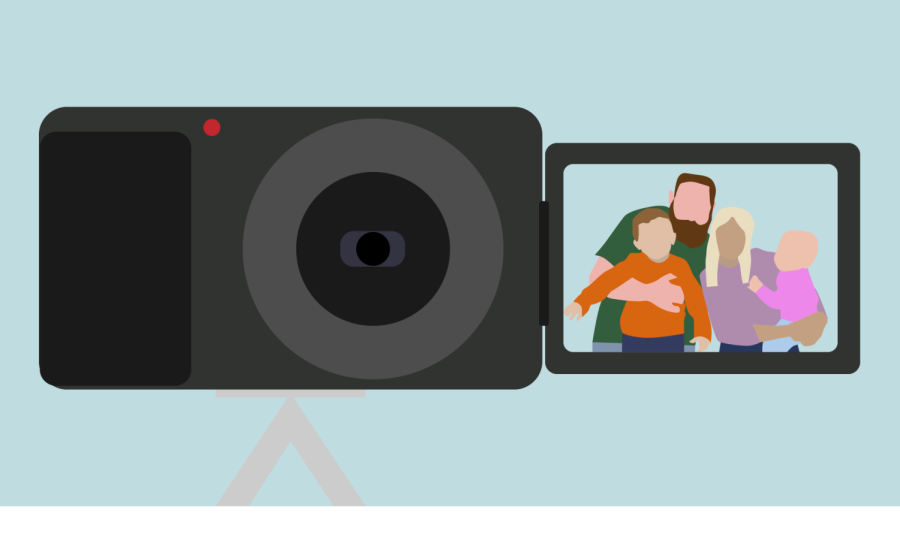Cushman: Family Vlogging Shows Us the Dangers of Sharing Our Kids Online
(Graphic by Claire Peterson | The Daily Utah Chronicle)
January 19, 2022
Growing up, my mom always prided herself in not using social media, so much so that it often made me eye-roll. But as an adult, I’m grateful that my mom didn’t use social media to share my life online. Today, the lives of many children are shared online in a way they cannot control. 75% of parents share content of their children online, most of the time using their kids’ real names which makes the information more easily identifiable.
When parents use their kids to create online content, these children’s wellbeing becomes secondary to the views and money they garner. And more alarmingly, children’s consent about what their parents post about them is removed, leaving them vulnerable. As an audience, we need to be mindful of the influence these family vloggers have on us. We should consider their harmful impact and think about how we share content that includes the children in our lives.
The Harms of Family Vlogging
Children today are often featured online before they even know enough to navigate the internet or understand its implications. One parenting blogger shared that even when her teenage daughter asked her not to share her life online anymore, she felt as though she couldn’t stop because it had become a part of her online identity.
But sharing children’s lives online causes issues even deeper than that. With the rise of platforms like YouTube, many families even vlog their children’s day-to-day lives. These vlogging channels, while they may seem harmless, cause a lot more harm than we may realize.
In 2021, mommy vlogger Jordan Cheyenne accidentally left a clip of her coaching her son to cry in a YouTube video about their dog’s medical diagnosis. Another family vlogging YouTube channel known as the Ace Family came under scrutiny in 2019 when Austin McBroom bought a little girl a phallic-shaped sucker.
In 2018, another family vlogger “pranked” his kids by putting laxatives in their ice cream and filmed them in the bathroom even as they tried to close the door. The footage showed his kids crying out in pain saying their stomachs hurt. Most people see how those channels are a problem, but even less obviously abusive family vlogging content can harm kids.
And in 2017, one vlogging family came under fire after “pranking” their kids with disappearing ink. The parents sprayed the ink on the bedroom carpet of their two sons, then screamed at them for ruining the carpet. The boys started crying, desperately trying to tell their parents they didn’t do it. The so-called “prank” was severely emotionally abusive.
Fame Over Wellbeing
Many modern-day children google their names only to see years of content including them already online from parents, schools and extracurriculars. The Atlantic reported experiences from kids who were shocked to find their sports scores, photos and personal details available on the internet for anyone to find — all without their consent. Family vlogging takes this non-consensual sharing to the extreme by sharing hours of footage of their young children. They make this behavior seem okay or even desirable to their audience.
The Ace Family, for example, often flexes the wealth their family vlogging has earned them. Sharing pictures of the children in our lives may not be outright abusive like the pranks some family vlogging channels have done. It may not be as invasive as some family vlogs. But it still takes away consent and the ability of children to shape their own online image.
Modeling Consent
As viewers of online content, we need to be mindful of who we support. When parents use children’s tears to garner views or invade their children’s privacy, we have a responsibility not to enable this behavior with our views. We must recognize how this content influences what we think is okay to share about children we know.
We have an obligation to change our culture and model consent to our own children. This starts by talking to the kids in our lives when we share a post about them or with their picture, and what that might mean for their online image and safety. By creating a space of informed consent and limiting what aspects of their lives we share, we can give them the agency to share their lives as they see fit when they’re old enough.
The children we know, whether they are our own children, our siblings or family friends, deserve loved ones who prioritize their safety and wellbeing over an online presence. The next time I talk to my mom, I’ll thank her for considering my wellbeing over her online persona. In the meantime, I’ll make sure to question the media I see and model consent to the children in my life by not sharing their life online.









